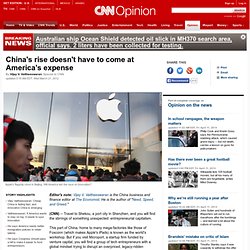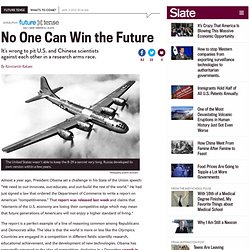

China's rise doesn't have to come at America's expense. Apple's flagship store in Beijing.

Will America win the race on innovation? Vijay Vaitheeswaran: Cheap China is fading fast, and innovative China is emergingVaitheeswaran: If America wants to stay on top, it needs to spur innovationHe says America needs better immigration policies to retain talentsHe says Congress should pass a bill to make it easier to fund entrepreneurs Editor's note: Vijay V.
Vaitheeswaran is the China business and finance editor at The Economist. He is the author of "Need, Speed, and Greed. " (CNN) -- Travel to Shekou, a port city in Shenzhen, and you will find the stirrings of something unexpected: entrepreneurial capitalism. This part of China, home to many mega-factories like those of Foxconn (which makes Apple's iPads) is known as the world's workshop. Much has been made about Chinese sweatshops sucking away American jobs, of currency manipulation and unfair trade practices. Cheap China is fading fast, and innovative China is emerging. Vijay V. U.S. scientists are not competing with China or any other country. Wikipedia, public domain.

Almost a year ago, President Obama set a challenge in his State of the Union speech: "We need to out-innovate, out-educate, and out-build the rest of the world. " He had just signed a law that ordered the Department of Commerce to write a report on American “competitiveness.” That report was released last week and claims that "elements of the U.S. economy are losing their competitive edge which may mean that future generations of Americans will not enjoy a higher standard of living. " The report is a perfect example of a line of reasoning common among Republicans and Democrats alike. The idea is that the world is more or less like the Olympics.
Obama and the Republicans might disagree on the answers, but they agree on the question: "How can America compete with the rest of the world, especially China? " The extremely complicated interactions between countries—goods, people, culture, and ideas all flowing back and forth—are not akin to a sporting competition. Whether or not the U.S. is declining is the wrong question. As co-chair of the editorial board of the journal International Security, I couldn't be more delighted by the attention that Michael Beckley's article questioning China's rise (and America's supposed decline) is getting.

See here, here, and here. But I fear that people who are seizing on Beckley's article to pooh-pooh fears of U.S. decline -- including our own Daniel Drezner -- are mostly asking the wrong question. As I've noted elsewhere, the issue isn't whether the United States is about to fall the from the ranks of the great powers, or even be equaled (let alone surpassed) by a rising China.
The world may be evolving toward a more multipolar structure, for example, but the United States is going to be one of those poles, and almost certainly the strongest of them, for many years to come. All this may seem like a hair-splitting, but there's an important issue at stake. Joe Raedle/Getty Images. Not Fade Away. The world order: The stakes of American hegemony.
America’s Future.